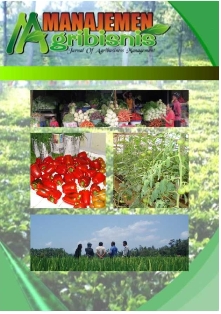Strategi Pemberdayaan Koperasi Tani Berbasis Agribisnis di Kabupaten Badung (Studi Kasus pada Koperasi Subak Uma Lambing)
Abstract
In the context of developing agribusiness system, the role of agricultural cooperatives can be found in the development of aquaculture subsystem, subsystem upstream, downstream subsystem, as well as sub-systems support. In subsystem supporting cooperatives, they play an important role in the development of human resources of farmers, transfer of technology, the availability of capital and insurance, as well as leading negotiator at the same time advocates in developing a business climate that protects small farmers fate. The research objective is to determine the internal and external factors on the empowerment of farmer agribusiness-based cooperatives, formulated strategies needed to empower farmer agribusiness-based cooperative and to determine the most appropriate strategy in empowering farmers agribusiness-based cooperative at Farmers Cooperative Subak Uma Lambing, Sibang Kaja Abiansemal District Badung. Based on the results of the study, it showed that the internal and external factors are the strength of cooperatives is the channel of distribution, cash position, favorable location, the application of appropriate technologies, organizational structures are used, cooperative permission, assistants, a permanent member of the diverse, partnerships in term of purchasing the agricultural products from members. Internal factors which are weaknesses is the weakness of managerial, functional, operational, structural, and psychological, quality of human resources, ownership of the cooperative, the ability of cooperatives to buy the agricultural products, the means of production equipment, the spirit of using the services of the cooperative, capital accumulation through the principal savings and deposits compulsory. External environments which are the environmental of opportunities and threats are economic, social, cultural, demographic, political, governmental, legal, technological, competitive, governmental policies, guidance and supervision, the capacity of agricultural products, as service providers. External strategic factors include the rate of the economy, changes in interest rates are constantly changing, climate change. The strategy that needed to be formulated is the strategy of increasing financial capability, development, marketing, human resource development, regulation and control. The most appropriate strategy is to apply the principles of good corporate government (GCG).













